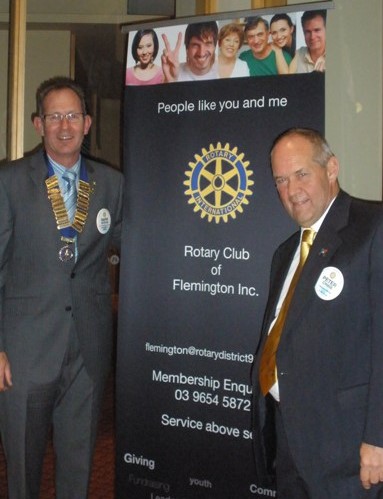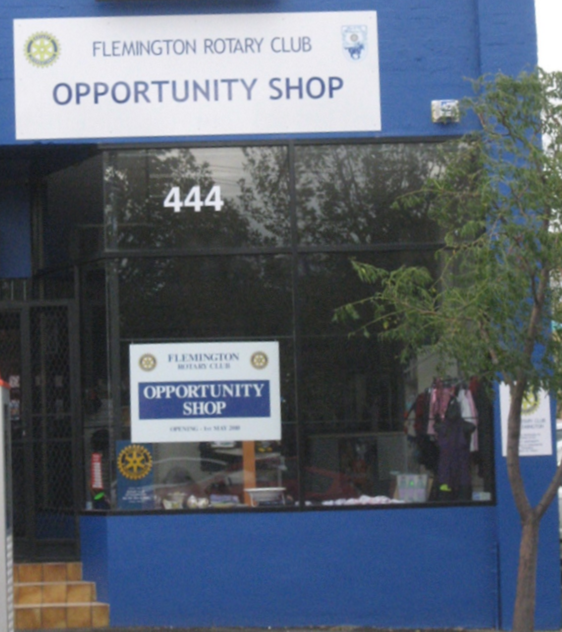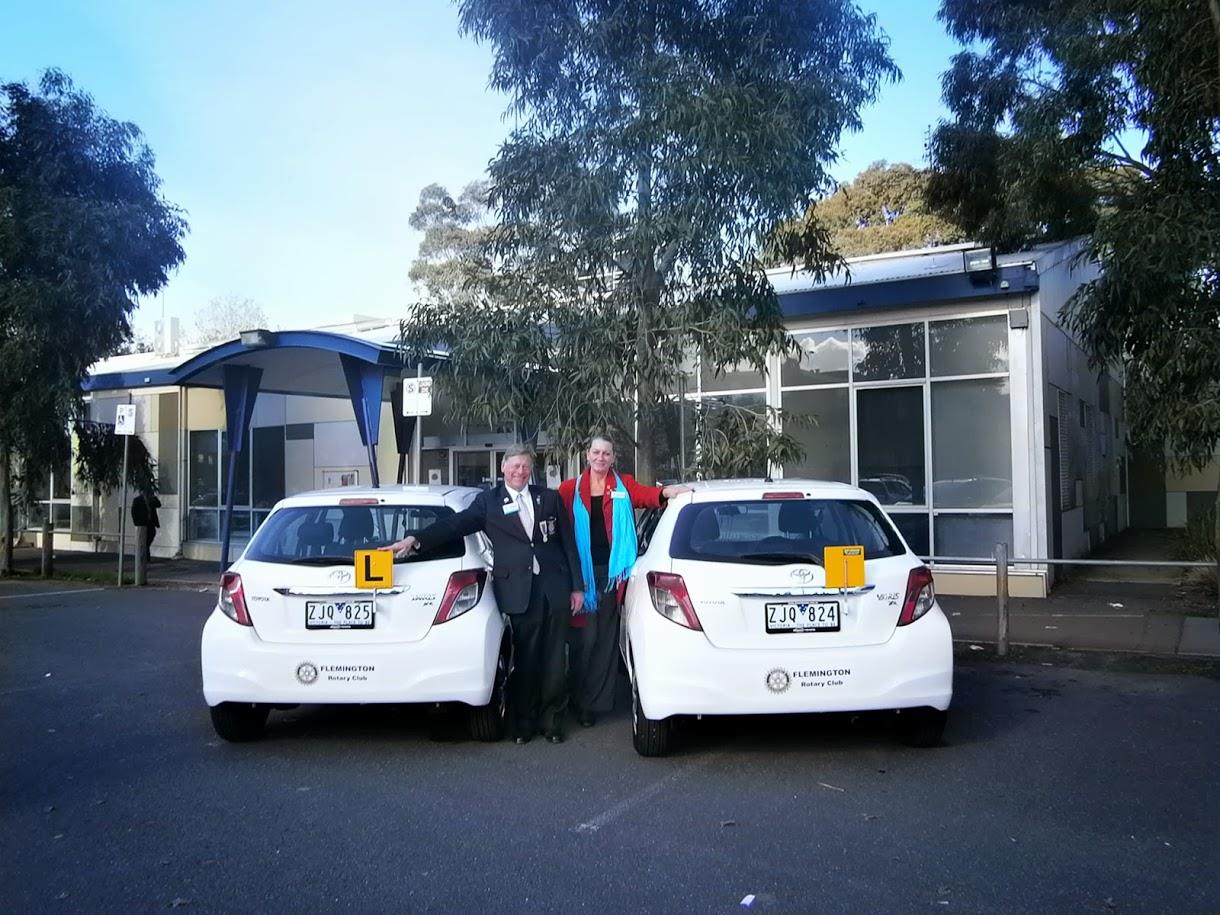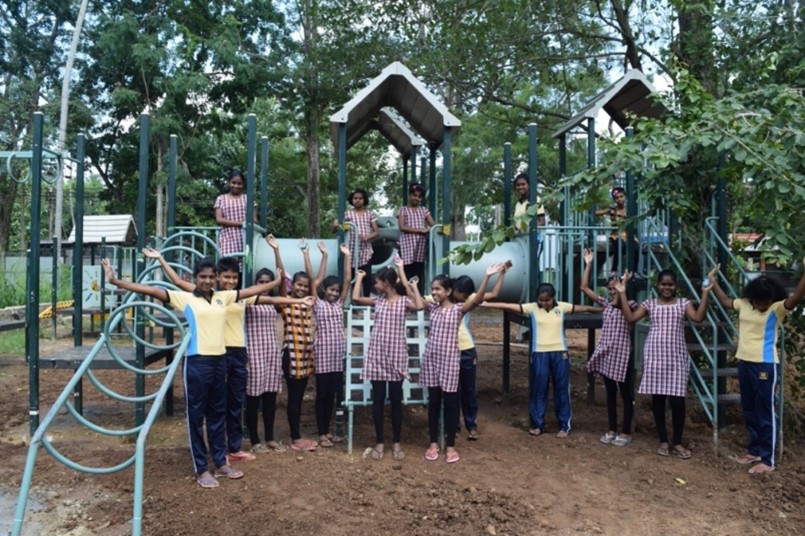 Peter Theodore Cribb was inducted as a member on 5 April 2006nominated by PP Allan Bruno.
Peter Theodore Cribb was inducted as a member on 5 April 2006nominated by PP Allan Bruno. He was Club President in 2009-2010 following on from Mark Ingram.
Peter has been recognized for his efforts with Paul Harris awards in 2010, 2012, 2019, and a PHF with 3 sapphires in 2021. He has contributed to the Rotary Foundation annually since 2009 and is EREY banner eligible.
During his years as a member, he has introduced 5 new members: Anwar Alishek, Anne McMahon, Barbara Champion, Abdi Hassan and Mohammed Abbas Omar.
Peter is honoured for his efforts in the Flemington Neighbourhood Renewal Project, as a Board Member of the local Bendigo Bank and for his efforts in establishing the Op Shop, the RoadStart driving Program and the Rotary Overseas Recycled Playgrounds project amongst other activity.



I was born in July 1944, the first child after nearly five years of marriage to older parents. My only sibling, my brother Paul, was born nearly five years later.
The family home was near Wattle Park which was an outer suburb of Melbourne at the time. My parents were married in 1939, after the outbreak of WW2 and housing was tight. My father was trained as an Industrial Electrical Engineer and worked at the Commonwealth Aircraft Factory building planes for Australia’s war effort and my mother was a seamstress working in the thriving garment industry in and around Flinders Lane when she married.
As was expected at the time she stopped work and became a housewife, the long wait for a child meant I was indulged as a youngster!
As was expected at the time she stopped work and became a housewife, the long wait for a child meant I was indulged as a youngster!
My upbringing was very Anglo-Saxon with dad being a fourth generation of a family from London. Mum’s family, McArthurs and Scovells had, some generations before, come from Ireland and Sweden. Mum’s family were poor and she had known hard times as she grew up. She was one of six who were always close and afforded me an extended family network. Mum’s maiden name was Molly Ulysses Scovell. Her mother’s brother, David McArthur, was killed as he landed on the beach at Gallipoli after disembarking from HMS Ulysses. If mum had been a boy she was to be named as David Ulysses Scovell.
Perhaps this led my mum to refuse me being called Henry Theodore Cribb, the fourth! I did keep the Theodore and it is the middle name of my eldest son and his son. Dad was born at the Boulder City Mine in Kalgoorlie where grandfather was the mine manager. Grandfather (Henry Theodore Cribb, the second, took his family with him when he was contracted to manage mines around the world, including Mexico and Venezuela, before retiring in Melbourne.
Dad’s brother purchased a dairy farm in Gippsland in 1948 and moved there with his unmarried sister and aged father. Grandfather died a few years later and my auntie married a neighbouring farmer. I think my fondest childhood memories are those of extended time spent on the two farms that could become isolated from Melbourne when bad weather rendered the roads impassable.
Dairy farming was a tough life at the time with little return financially for my uncle Vern, milking a heard of 40 plus cowed twice a day was labour intensive at that time. But the community in which he lived was mutually supporting. I witnessed a gang of farmers, including Vern, fell huge trees with axes and then use laege crosscut saws and steel wedges to reduce the forrest giants into fence posts that were shared and installed on their farms.
I witnessed the arrival of Italian share farmers who in return for the use of a paddock for three years would hand it back cleared of fern and sewn to pasture. Jimmy Osborne’s farm next to Vern’s saw its “loaned” paddock planted to peas, potatoes and tomatoes all planted and harvested by the extended family by hand. The family’s matriarch I knew as Nona. I spent a lot of time with these special people.
I witnessed the arrival of Italian share farmers who in return for the use of a paddock for three years would hand it back cleared of fern and sewn to pasture. Jimmy Osborne’s farm next to Vern’s saw its “loaned” paddock planted to peas, potatoes and tomatoes all planted and harvested by the extended family by hand. The family’s matriarch I knew as Nona. I spent a lot of time with these special people.
I attended Surrey Hills Primary School where I struggled with reading, writing and spelling, possibly due to mild dyslexia that was not detected at the time. I can remember arriving at school after a holiday break to learn from wide eyed classmates that some ‘wogs’ had enrolled. I was soon shocked that these ‘wogs’ were the same as Nona’s people! This was to be a life shaping moment.
After primary school I started at Box Hill High School, my father always proclaimed that a good tradesman was far more useful than a poor professional but bowed to mum’s wishes.
It was my maths teacher in year 7, Bill Pye, pity about the spelling, who took an interest in me. He saw something despite my general class work being unspectacular.
On completing school I went onto Melb Uni with no particular goal. It was probably falling in love and needing to become responsible that resulted in finishing my degree. Maths had become my interest and dominated my studies. As I had used a teaching studentship to fund my university studies, I was first appointed to Yea High School. Then followed over the next ten years, Glenroy High, Sale High and Melton High.
This was an era of great expansion in the education system as the post war baby boom and increasing school retentions came into effect. I quickly proved to be a competent and creative teacher and was appointed to the Education Secondary Mathematics Committee, the Mathematical Association, and became the first Education Department Mathematics Consultant
These growing experiences resulted in stints of secondment to the Education Departments Curriculum and Research Department leading to a permanent appointment at the level of Special Principal. During this phase I lead the team that wrote the Secondary Mathematics Curriculum for High Schools and other materials. In 1985, following a change in Government, the Curriculum Branch was restructured to the regions and I was appointed as the Education Director of the North-West Metro Regional Office. But I never took up the post. I had been presented with another option more in keeping with my skill set and passion, that of Mathematics Education Adviser to the Thomas Nelson Publishing Company with responsibility of shaping their products.
These growing experiences resulted in stints of secondment to the Education Departments Curriculum and Research Department leading to a permanent appointment at the level of Special Principal. During this phase I lead the team that wrote the Secondary Mathematics Curriculum for High Schools and other materials. In 1985, following a change in Government, the Curriculum Branch was restructured to the regions and I was appointed as the Education Director of the North-West Metro Regional Office. But I never took up the post. I had been presented with another option more in keeping with my skill set and passion, that of Mathematics Education Adviser to the Thomas Nelson Publishing Company with responsibility of shaping their products.
Sufficient to say that this led to increasing managerial roles at Nelson, Harper Collins and finally Cambridge. After some years in the Melbourne Officer of Cambridge University Press as the Publisher, I was asked to move to the head office in Cambridge UK. I took up a position as a Director of Cambridge Education and also of Cambridge Hitachi.
Health issues brought be back to Australia after agreeing to be seconded to a joint Cambridge UNESCO project in Southern Africa over the following two years. These African experiences were significant and were the first steps to the setting up of an outreach program from Cambridge University into African schooling.
It was on my return to Australia from the Cambridge appointment that I met a bunch of Rotarians from the RC Flemington running a BBQ at Office Works at High Point. I attended a number of meetings as a guest before joining the club in 2006. There were some club members who encouraged and supported a view that the focus was service and not Rotary. I was never very interested in the Rotary calendar of community dabbles.
There were big issues particularly connected to the surrounding Public Housing Estates. The existing club loyal oath spoke of service through Rotary (not to it) and the meeting toast advocated “…fellowship through service”.
Associations with the Flemington Neighbourhood Renewal Project and the Local Bendigo Bank, both because of my Rotary involvement, allowed me to strengthen and widen my community involvement.
I certainly pushed the acceptable boundaries of Rotary but with some significant gains to our local and international community. Some reflections starting with the OpShop.
It was Allan Bruno that told me that he believed that every Rotary Project started with one person. This was certainly the case when I decided that the club needed a ‘financial engine’ to remain relevant. Other clubs ran the likes of Monthly Markets, Annual Art Shows, etc to generate the cash to power their community work. I got the idea of an OpShop after seeing the one in Forrest Hills run by the RC Box Hill. Our club took a lot of convincing that the work and financial risk was worth it!
I seem to remember that it took me six months to convince enough in our club to take the chance, arguing that the idea also generated training opportunities and enhanced the club’s visibility. Thanks to Allan Bruno, who managed the shop’s establishment and Dulcie Heard who was the initial Manager, the project was a success and the rest is history. The lesson - Don’t wait for majority approval of the club before working on a solution.
One of my community involvements early in my Rotary was as a driving instructor for a program run by the legal unit at Wingate Community Centre. I was motivated by the aim of this project which was to reduce the number of residents from the public housing estate gaining criminal records for driving without a licence.
It was explained to me that the problem arose when someone obtains a job, perhaps night shift, that can only be managed with a car. By this time a new driver first needed to obtain a log book of hours driving under the supervision of an experienced licenced driver. How do you do this when you have no extended family to provide the supervised driving and/or no access to a car? The Wingate program filled the gap. But then the loan car from a dealership was no longer available and the project stopped overnight.
I had connections to the state minister for Roads & Transport and I was a member of the Rotary Club of Flemington! We would seek a grant and take responsibility for a Driving School to serve the surrounding housing estates! Whilst the club members were generally not interested in the idea, I drafted a proposal of the financial needs and how we could manage the project. I managed to convince the club board and President Allan Bruno commissioned the writing of a professional standard submission to the State Government that proposed the purchase of two cars. The prposal was approved with one provision, that it had to be at “arms-length” from the club.
The choice was the management staff of the Flemington Neighbourhood Renewal Program down at Debney Park. The proposal involved the use of licenced residents of the Highrise Estates, paying them a small fee each time that didn’t breach their government pensions, thus guaranteed an iniial pool of supervising drivers. A side benefit of this arrangement saw these supervisors gain work experience that assisted them when applying for full time work.
This arrangement meant there was no financial obligation on our Rotary Club nor ongoing personnel but lots of community visibility from the cars. Worked well until the Flemington Neighbourhood Renewal Project (FNRP) was terminated and the vehicles transferred to the LtoP project run by the Moonee Valley Council.
Sure, there were personal connections to the Minister, but this project was established because we were Rotary and that it had members who would not accept no.
Sometimes an outcome comes at a cost. One occasion arose concerned the rat plague at the Debney High Rise Estate. The problem was serious with swarms of rats all through the grounds, the buildings and Debney Primary School! After various attempts to control/eradicate the problem the FNRP professional staff determined that a whole estate community education program on hygiene methods was required, at considerable cost and resisted by the residents who saw it as another belittling project.
Walking across the estate one morning I became aware of the overflowing rubbish bins, many partially broken, in the compounds at the base of each Highrise Tower. After failing to gain traction with the centre staff I took photographs of the bin problem over several weeks and submitted a report to the State Department of Housing and the Moonee Valley Council demanding action be taken or I would go to the press.
Very soon I was told that funds had been granted to replace the bins across the estate and that a second bin collection will be immediately introduced by the Moonee Valley Council. The rat problem quickly disappeared and the dignity of the estate residents retained. This would not have happened had I not had the community standing through Rotary. Rotary gives you wings, you can do so much as a power of one.
But Rotary also provides you with a people network. If it were not for a club member who is a lawyer, a member of the local Horn of Africa member would have been deported.
This person, driving back from the airport on a stormy wet night, had mistakenly driven part the way down the off-ramp onto the Tullamarine Freeway. Not sure what she should do and concerned for her safety and that of the on-coming traffic she rang the police. They came, and after sorting the problem, advised her that she would be charged with dangerous driving (not a simple driving offence), a charge that should she be convicted would see her deported.
When she came to me seeking help I used the Rotary Network to obtain legal representation pro bono from one of our club members that would result in the charge reduced to a fine and avoiding deportation. In Rotary you are never alone, but the first step is yours.
The status of Rotary opens doors! Our club sent a container of goods to the Sputnik Girl’s Home in Centra Sri Lanka, a project I initiated after meeting with the home’s Director in Adelaide. The project was supported by many of our club’s members and the cost of the shipping covered by club funds.
This project included an outdoor playground that was installed at the school.
The 9800 DG at the time challenged me and the club to send more playgrounds which would result in the RORP project. But the energy from our club members for this extension had largely faded following the successful shipping of the first container. There was no enthusiasm by the club to fund the ongoing shipping costs and the thought of the physical efforts by members to dig out a playground was a no-go! Persevere! There is always another option. strategies were found to overcome all of these blockers, strategies that required goodwill, generosity and flexibility by all involved in the playground industry.
This simply would not have been possible had it not been a Rotary Project! Rotary opens doors, be persistent!
A commitment given by all members in the past at the start of all club meetings included “service above self”. For me this meant supporting requests when asked. Retiring from active membership means I can now pick and choose tasks that acknowledge my age.
